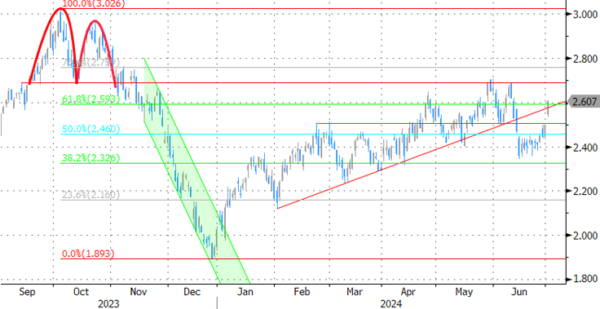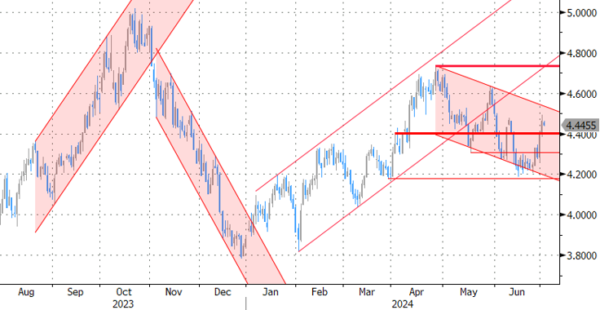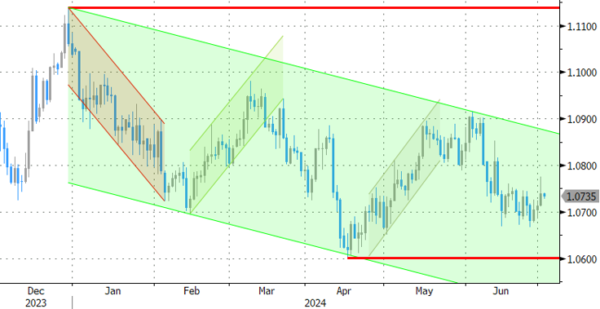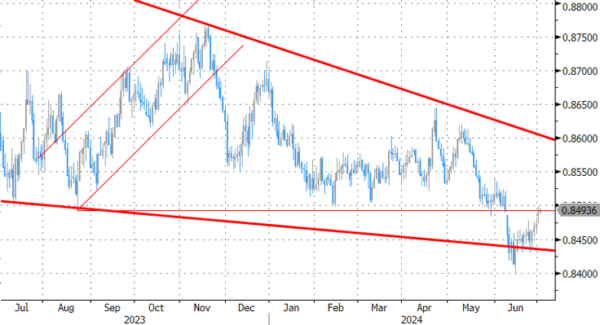Markets
The relief rally in the wake of the first round in the French elections shifted in lower gear as the session went. It dawned that an RN absolute majority remains a possibility after next Sunday. This evening we’ll know more about how Macron’s centrists and the far-left seek to prevent that from happening by tactically withdrawing candidates. The final list is due by 6 PM and will give a clearer view, including for the pollsters. European stocks pared a 1.8% gain (EuroStoxx50) to just 0.74%. The common currency traded as high as 1.0776 before closing at 1.074 against an overall solid dollar. USD/JPY strengthened towards a new 34-yr high at 161.46. The only European financial variables that closed near or at intraday highs were core bond yields. German yields sprinted between 9.1 and 10.7 bps higher, unwinding some safe haven gains. Semi-core and peripheral spreads dropped with France’s tightening 6 bps on the day. Bunds underperformed Treasuries where an unexpectedly declining US manufacturing ISM (48.5) kept front-end yields at bay (+0.3 bps for the 2-yr). Longer tenors took the lead ever since the debate between Biden and Trump brought victory for the latter. A Trump presidency raises the specter of increased spending, which is pressuring the long-end in particular through risk premia.
The economic calendar today features the June European inflation reading. After several national numbers printing bang in line with expectations (including Germany’s yesterday), any deviation from a 0.2% m/m and 2.5% (headline, from 2.6% in May) consensus should be small. Core inflation is expected to marginally ease to 2.8%. We keep a close eye at services inflation (4.1% in May) for possibly having the biggest market moving potential. Inflation takes center stage at the ECB Sintra conference as well today with a deep dive into its drivers and the impact of geopolitical shocks. In her opening speech yesterday, ECB president Lagarde warned not to be complacent on the matter. She said that uncertainties remain and that “It will take time for [the ECB] to gather sufficient data to be certain that the risks of above-target inflation have passed.” Quotes coming from the symposium may trigger some intraday volatility in a trading session that’s going to be predominantly technically inspired. As the French dust settles (for now, that is), focus is now shifting towards the elections in the UK on July 4th. Sterling in recent weeks has been steadily losing ground vs the euro. EUR/GBP is currently closing in on the 0.85 barrier. This compares to the failed test of the 0.84 support mid-June.
News & Views
UK shop prices declined by 0.2% M/M in June, with both food (-0.1%) and non-food prices (-0.2%) contributing. The Y/Y-pace (0.2% from 0.6%) is the slowest since October 2021. On the non-food part, retailers tried to drive sales by discounting. This was particularly true for TVs with great deals to capitalize on the Euros fever. Food prices are still 2.5% higher than a year ago, but the disinflationary process continues. Non-food prices are down 1% Y/Y. Chief executive at the British Retail Consortium, Helen Dickinson said the slowdown is shop price inflation is at least partly due to improvements in operations and supply chains at the height of the cost of living crisis to compensate for the impact of global shocks on input costs. These investments are now paying off. In a clear message to the next UK government, the BRC advices to address some of the remaining major cost burdens weighing down the retail industry (eg broken business rates system) to help reduce the cost of living pressures.
Hungary took over as president of the EU council yesterday in the 6-month rotating role. In a column in the Financial Times, Hungarian PM Orban launched the view to “make Europe competitive again” building on work/popular themes since the start of the year. A new green deal, involving industrial stakeholders, and fixing heavy tax burdens for corporates is key to making Europe a more attractive investment destination again which could be the step-up to new economic success. Apart from the competitiveness, Orban suggest to curb illegal migration, shape the future of cohesion policy to achieve greater convergence among regions and establish the foundations of a farmer-oriented EU agricultural policy.
Graphs
GE 10y yield
The ECB cut its key policy rates by 25 bps at the June policy meeting. A more bumpy inflation path in H2 2024, the EMU economy gradually regaining traction and the Fed’s higher for longer US strategy make follow-up moves difficult. Markets are coming to terms with that. Meanwhile, some of the save haven bids were reversed after the first round in the French elections. The 2.34%-2.4% support zone looks a solid one.
US 10y yield
The Fed needs more evidence than just one slower-than-expected (May) CPI is providing. Upgraded inflation forecasts and a higher neutral rate complicate the timing of a first cut further. June dots suggest one move in 2024 and four next year. The long end of the curve is supported by increased odds of a Trump presidency after the debate with Biden. The spectre of increased spending (risk premia) pulled the 10-yr away from the 4.2% support area.
EUR/USD
EUR/USD is stuck in the 1.06-1.09 range. The desynchronized rate cut cycle with the ECB exceptionally taking the lead, strong US May payrolls and a swing to the right in European elections pulled the pair away from 1.09. The Fed meeting balanced the weaker than expected US CPI outcome. The increased probability of a hung French parliament after the first round offered the euro some relief.
EUR/GBP
Debate at the BOE is focused at the timing of rate cuts. May headline inflation returned to 2%, but core measures weren’t in line with inflation sustainably returning to target any time soon. Still some BoE members at the June meeting appeared moving closer to a rate cut. This might cap further sterling gains. The euro’s vulnerability to political event risk going into the French elections eased for now. EUR/GBP 0.84 is becoming solid support.




